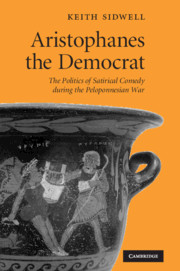Book contents
- Frontmatter
- Contents
- Detail of illustration
- Preface
- Acknowledgements
- List of abbreviations
- PART I SETTING THE STAGE
- PART II THE POETS' WAR
- Conclusions and consequences
- PART III APPENDICES
- Appendix 1 The view from the theatron
- Appendix 2 Metacomedy and caricature in the surviving fourth-century plays of Aristophanes
- Appendix 3 Timeline and proposed relationships between comedies
- Appendix 4 The date of Eupolis' Taxiarchoi
- Appendix 5 Clouds 868–73 and τραυλίζω
- Appendix 6 Michael Vickers on Strepsiades and Pericles
- Bibliography
- Index
- Index Locorum
- Index of Modern Scholars
Appendix 4 - The date of Eupolis' Taxiarchoi
from PART III - APPENDICES
Published online by Cambridge University Press: 27 January 2010
- Frontmatter
- Contents
- Detail of illustration
- Preface
- Acknowledgements
- List of abbreviations
- PART I SETTING THE STAGE
- PART II THE POETS' WAR
- Conclusions and consequences
- PART III APPENDICES
- Appendix 1 The view from the theatron
- Appendix 2 Metacomedy and caricature in the surviving fourth-century plays of Aristophanes
- Appendix 3 Timeline and proposed relationships between comedies
- Appendix 4 The date of Eupolis' Taxiarchoi
- Appendix 5 Clouds 868–73 and τραυλίζω
- Appendix 6 Michael Vickers on Strepsiades and Pericles
- Bibliography
- Index
- Index Locorum
- Index of Modern Scholars
Summary
It seems worthwhile to examine briefly once more the arguments for the dating of this play. The 427 date was set on the basis that (a) Phormio was a character in the play (Σ Peace 348; fr. 268.15 and 34) and (b) he vanishes from Thucydides after 428. Handley 1982, however, dated the play to 415 on the basis of a series of oinochoai which probably have reference to comedy (photographs in DFA2 plates 86 and 87). One has two characters whose names]ΟΝΥΣΟΣ [onysos] and ΦΟΡ[[Phor]) can be reasonably restored as ΔΙ]ΟΝΥΣΟΣ (Dionysus) and ΦΟΡ[ΜΙѠΝ (Phormio). The other has a man rowing astride a fish. With the vases was discovered an ostrakon ‘inscribed for the ostracism held in 415 bc or a neighbouring year, at which Hyperbolos was exiled’ (Handley 1982, 24–5. See Crosby 1955, 81f.). We know from Σ Peace 348 that Dionysus was a character in Taxiarchoi, and went to Phormio to learn the ‘laws of generals and wars’. Wilson 1974 has demonstrated that the play contained a rowing scene, possibly the antecedent of that in Frogs. But the proximity of the ostrakon does not prove that the play which the painting represents was recent, because the pots may have been around some years before they were buried. Our dating system for these artefacts could certainly not be said to be accurate within ten years, so that the play may still be Taxiarchoi and the date of production back in the early 420s.
- Type
- Chapter
- Information
- Aristophanes the DemocratThe Politics of Satirical Comedy during the Peloponnesian War, pp. 346 - 348Publisher: Cambridge University PressPrint publication year: 2009



